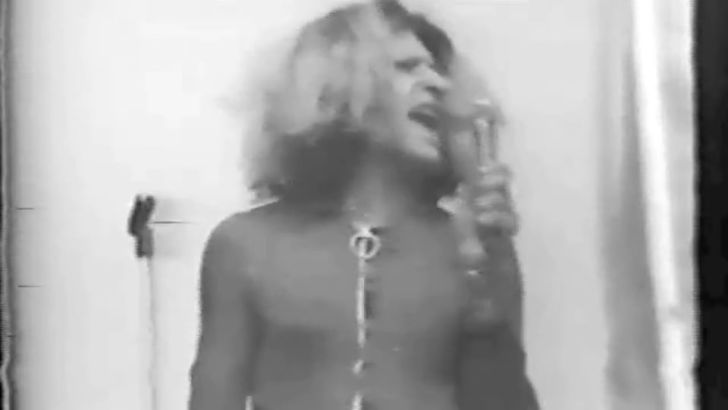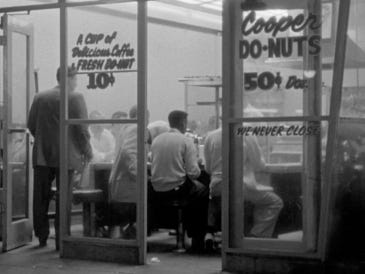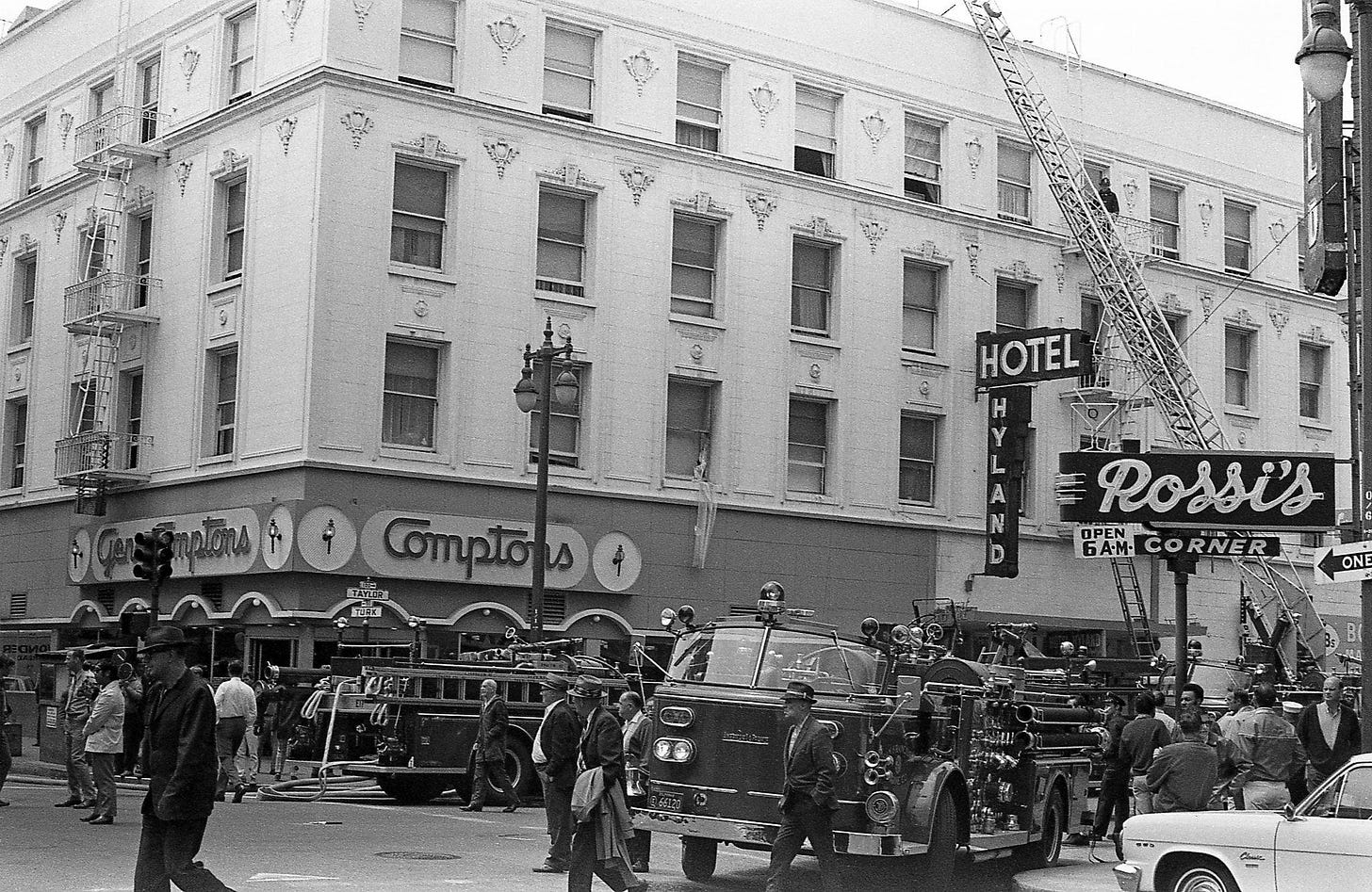It’s Pride Month, and all of my posts this month are going to be about trans joy, which is something that doesn’t get nearly enough attention in the world. Bear in mind, some moments of trans joy show up in unlikely places, and some start out as anything but joyous occasions. In each case, this is a month of happy endings. However you celebrate Pride—whether you’re a seasoned parade-goer, a new ally looking for ways to high-five your friends, or a parent thinking about how to celebrate Pride with your kids—I wish you all the love, glitter, and disco music your heart desires.
With few opportunities to spend time in person with my coworkers and friends, I virtually leapt at the chance to head downtown this week, to spend some time celebrating the Asian American Native Hawaiian Pasifika (AANHP) community, drink bubble tea, and gaze at beautiful art made by colleagues. And when that was done, my very good friend and I departed to a coffee house to drink mochas and catch up.
We have known each other for over twenty years. We’re tied together at work and in our personal lives. And just like any close friend, like family, sometimes we disagree or say hurtful things. We strain against one another, we bicker, and then we come back together with a better understanding once the air is cleared.
But.
Fair warning, this is about to get uncomfortable.
I am still uncomfortable.
Once upon a time I called myself a lesbian. It was one of those titles given to me by someone else, and it hadn’t ever been a comfortable fit. I thought that had to do with all the social stigmas around gay identities, but when I announced my queerness to others I always chose the title “gay” instead of “lesbian.” Funny how that makes more sense now that I know I’m transgender. I wasn’t really a girl, so it’s no wonder “lesbian” felt wrong to use. Nonetheless, the world perceived me to be a lesbian.
My coworker/bestie is a lesbian, too. She loves that title. She wears it with pride. And that’s cool.
She was one of the very first people I came out to as trans. I told her in person, and she said back, “Well yeah, that makes sense.” But we’re well past the two-year mark since that day, and she still misgenders me. She still refers to me with female pronouns. She still finishes phone calls with “later, girl.”
One of the ways that I’ve chosen to approach my gender transition is by being incredibly open to folks making mistakes, to letting them misgender me without correction, to being understanding about how difficult it is to manage what everyone thought I was before compared to who I am now. It hasn’t always been the best idea. I suck at standing up for myself. I’m terrible at correcting anyone. I shrink and I wave insults off, I shrug my shoulders. I internalize all of it. And it’s all to my detriment. I spend a tremendous amount of energy making others comfortable by absorbing all of the discomfort myself.
Yes, that’s really stupid.
Yes, that’s really normal.
But today is all about spending time with a friend, all about getting a great mocha, watching folks walk by the café in the rain. And once our cups were in hand, we settled into an easy conversation. It started off easy, anyway.
“I loved how that art presentation included a queer artist. Their speech was outstanding,” I said. And it had been. “There’s so much intersectionality in the LGBTQIA2S+ community.”
“Ugh,” my coworker grimaced, “no. No. That’s just too many letters.”
“No it’s not,” I waved her off. “It rolls off the tongue effortlessly.”
But her expression soured. “It doesn’t. No more letters. No more identities. We’ve had enough. In fact,” her face lit up with a thought, and if you are trans like me, you are instinctively tensing up in anticipation of the next comment. I did. We all do. Because we know where this is going. We have heard it before, and the person saying it always thinks they are so clever, but it’s just a tired old trope. “In fact,” she said, “I think the T should get removed from the LGB. We’re nothing alike. We have nothing in common. And you don’t need us anyway.”
I would love to tell you that I responded with something witty, or that I tossed my coffee cup at her in a bitter rage. I’d like this story to be all about how I gave her a good schooling over her own queer history that she clearly doesn’t know. I should have gotten angry. I should have shouted or thrown a fit. I should have at least walked away to show her how big of a line she crossed with her words.
I should have done so many things, and I did nothing at all. I absorbed it. I took that shame in and swallowed it, and I rinsed it down with chocolate and coffee and whipped cream that didn’t even have flavor anymore. It’s still in there, swimming around in my stomach.
For those of you who are newer to the queer community, this is an old story of the Hatfield’s and the McCoy’s. It’s a story of self-loathing. It is the othering by the othered. I’ll give you a breakdown of that history in a moment, but before we go there, I want you to watch the rageful beast of anger and hurt that Silvia Rivera hurls at her queer siblings in 1973. For context, Silvia was one of many transgender people who were pivotal in the gay rights movement of the 60s and 70s. Ironically, it took the power of the trans community to propel us into a future that would come to accept the gay, lesbian, and bisexual community in my lifetime. And it left the transgender community behind.
A brief note of warning here, this video is not edited for language or content, and it is likely not suitable for young children or sensitive audiences. But it is an essential moment in queer American history, and if you haven’t seen Sylvia’s speech, it is powerful.
The Stonewall riots weren’t the first in the series. Before them was Compton’s Cafeteria in 1966 and Cooper’s Do-nuts in 1959. And in each of those cases, just as at Stonewall, the riotous rebellion was led by transwomen who were simply done with being bullied and harassed by police raids.
You see, queer history has always been about transgender folks just as much as it’s about gay, lesbian, and bisexual people. But when your group is constantly targeted and trolled by relentless hate, survival makes us all do things that don’t show the best parts of our humanity. We sacrifice others so that we can find freedom. We run from the fight. We stay silent when we should speak up.
And we say things like LGB without the T.
We say things that hurt.
I’ve taken a while now to consider all of this, to make space for my hurt and all the emotions wrapped up in that moment in a coffee shop on a rainy Seattle afternoon, and I know now what I want to say. I know the answer that’s important to me, that respects my transcestors, that holds my community close to my heart. So here it is.
My love is big enough to hold my arms wide open.
My community—my big queer, trans, gay as hell community—is better with all of us in it, including those who are allies. I will throw bricks for my queer family. I will start a riot for my trans siblings. I will paint myself in rainbows and hug the utter shit out of haters. This is my community, and I welcome you into it.
My community does not exclude.
My community is not threatened by having to reinvent its flag.
My community loves every letter that makes up our name.
My community is growing, and I cannot wait to see what we look like in a year, in a decade, and when I am an old man.
My community will always include the T, because that’s who I am, and I have never been so proud in all my life to be a transgender man than I am right now. And let’s face it, this community is me.
It’s you, too.
The power of the queer community is that we don’t push anyone out. We wait patiently with open arms, and everyone is welcome here. And if you feel that there is someone you need to exclude, I ask you to consider instead who you invite in with your words and your actions. Maybe you need this community, too. Maybe we built this community alongside you, and we’ve been waiting patiently for you to recognize our worth. Because we see yours.
My community is big enough to hold our arms wide open, and we’re waiting for you to step in for a hug. Happy pride.
Your trans friend,
Robin
PS – If you want to know more about your own queer history, especially the amazing accomplishments of your transgender siblings, pick up a copy of Susan Stryker’s Transgender History. Read it cover to cover, and then pass it along to a friend.







Robin! Thank you for sharing this story. I'm sorry that happened to you. I think solidarity and acceptance within the LGBT!IA2S+ community is still lacking, and something that needs to be worked toward more committedly, but things have definitely gotten better for a lot of people. The gay and lesbian sectors of this community still have lots to learn. It was so ugly and divisive in the 70s and 80s when I was in NY. White cis people ruled. In the 60s the women's rights movement kicked lesbians to the curb because straight, white feminists didn't want to be associated with them. There are so many stories to tell. I haven't seen the Sylvia Rivera footage in a long time. Watching it again made me weep. What a brave trans person she was. Can any of us imagine leaving home at 10 years old to honor one's path? I can't. I met her a bunch of times in the 80s when I still lived in the city. Here's a link to her Wiki: https://en.wikipedia.org/wiki/Sylvia_Rivera
You are a phenomenal writer, and I'm grateful to call you my trans friend.